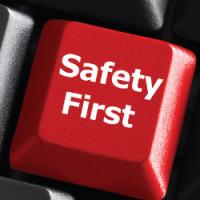- Posts: 350
- Thank you received: 11
Foot Protection
- Safety Toolbox Talk Webmaster
-
 Topic Author
Topic Author - Offline
- Administrator
-

Foot protection means guarding your toes, ankles and feet from injury. Believe it or not, your feet have 26 bones for support and 38 joints for movement in each foot. Feet also have blood vessels, ligaments, muscles and nerves, which is why it hurts when you stub your toe or drop something on your foot. Your feet are a critical part of your body that you use everyday and, in some cases, enable you to do your job effectively.
Protective footwear worn in the workplace is designed to protect the foot from physical hazards such as falling objects, stepping on sharp objects, heat and cold, wet and slippery surfaces, or exposure to corrosive chemicals.
There are two major categories of work-related foot injuries. The first category includes foot injuries from punctures, crushing, sprains, and lacerations. They account for 10 percent of all reported disabling injuries. The second group of injuries includes those resulting from slips, trips, and falls. They account for 15 percent of all reported disabling injuries. Slips and falls do not always result in a foot injury but lack of attention to foot safety plays an important role in their occurrence.
What should workers know when buying footwear for work? Good footwear should have the following qualities:
o The inner side of the shoe must be straight from the heel to the end of the big toe.
o The shoe must grip the heel firmly.
o The forepart must allow freedom of movement for the toes.
o The shoe must have a fastening across the instep to prevent the foot from slipping when walking.
o The shoe must have a low, wide-based heel; flat shoes are recommended.
People buying footwear for work should take the following advice:
o Do not expect that footwear that is too tight will stretch with wear.
o Have both feet measured when buying shoes. Feet normally differ in size.
o Buy shoes to fit the bigger foot. o Buy shoes late in the afternoon when feet are likely to be swollen to their maximum size.
o Consider purchasing shock-absorbing insoles when a job requires walking or standing on hard floors.
Please Log in or Create an account to join the conversation.
